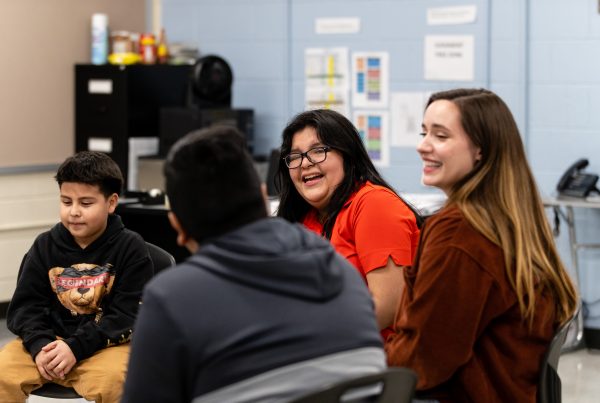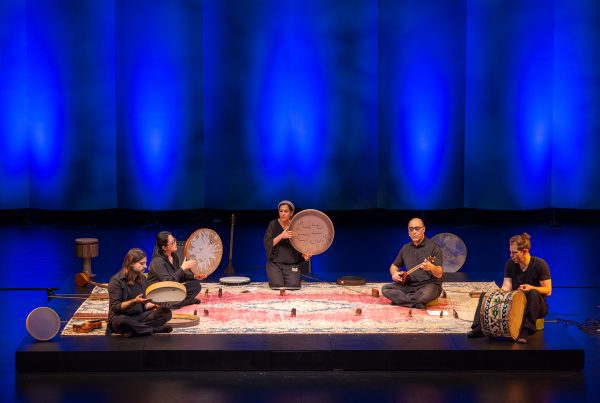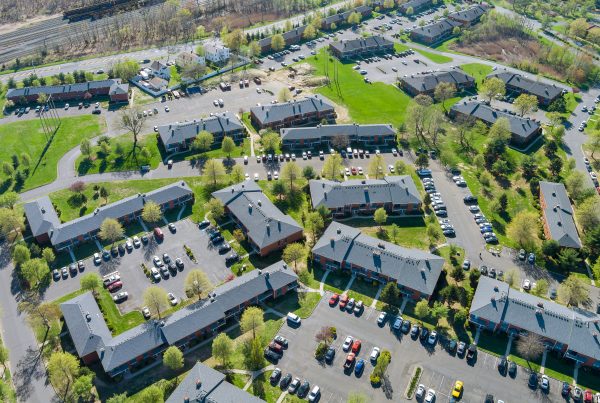Hanan Shaibu
NICE Transportation Specialist
A Sudanese Refugee in Nashville Brings Others Opportunity Everywhere She Goes
“Every day, I go pick people up and talk to them if they have something to say, if they are sad, if something is going wrong in their life. At the end of the day, I want to tell them something nice and make sure they know that everything is going to be okay and that it’s not the end of the world.” – Hanan Shaibu, NICE Transportation Specialist
Nearly two million people living in Darfur in western Sudan have been forcibly displaced as a result of an ongoing conflict between rebel groups in the region and the Sudanese government.
The war began in 2003 after two rebel groups, the Justice Equality Movement (JEM) and the Sudanese Liberation Army, launched an insurrection in protest of the national government’s perceived disregard for the Western region of Sudan and the diverse ethnic groups that live there.
However, numerous other environmental, political, and social factors contributed to the initial unrest that occurred in Darfur. Climatic change and natural disasters have led to widespread desertification in the region, which increased competition for natural resources between nomadic groups and established farmers. Additionally, intercommunal violence and deeply entrenched social inequalities exacerbated tensions between Darfurian communities.
In response to the rebel insurrection, the Sudanese government equipped and supported militias in the region, leading to an exacerbation of the violence and civilian casualties. While the Sudanese government and Darfurian rebel groups have attempted peace negotiations numerous times over the course of the past two decades, the ongoing conflict has created a severe humanitarian crisis, with civilians in Darfur lacking access to critical supplies like food and medicine. Both sides are suspected to have committed human rights violations as part of their war tactics. Peaceful relations in the region remain fragile.
A resurgence of violence between rebel groups and the Sudanese government occurred in early 2021, leading to hundreds more casualties. According to Human Rights Watch, an estimated 6.2 million people, over half of Darfur’s population, are in need of humanitarian aid in 2022.
Hanan Shaibu, a Transportation Specialist at NICE, experienced the hardship Sudanese refugees living in Darfur face first hand. When she was 14-years-old, she was caught in the middle of the fighting and was captured alongside her sister by one of the rebel groups involved in the conflict. She was able to escape with her daughter and nephew and began her journey to resettlement in the United States.
Hanan's Story
What was your experience as a refugee fleeing the war in Sudan?
After some time, I managed to escape the barracks one night. I told the soldiers that I was just walking near here and was going to visit a friend close by. I had my daughter and my nephew with me. I talked with my older sister and told her to be sure the men weren’t behind us because if we went, they were going to know that we were escaping. I ran with the kids and I met a good Samaritan that helped me and told me which way to go. I ran and I ran for almost a week.
Eventually, I reached a training center one day. People saw me as just this young girl with a little baby, and they would give me and the babies something to eat. I kept running, I left my sister there and then I finally met back with my mom and my brother in a camp. At this point, my mom had been in the hospital for almost three years and after my brother realized that my mom was in the hospital, he went and picked her up and brought her to the camp. Then, I joined them and we stayed in the camp for a long time, but my sister was nowhere to be seen. We didn’t know where she was. All I knew was that I left her in the barracks, but we could not go back to the barracks because these people were looking for us. If they found me and the kids, they were going to kill us.
After staying in the camp for a very long time, I went to school in Kenya. I finished my high school there and then after that I went to Uganda for school, similar to college. My mom and my family were all still in the camp and they continued to live there for 15 years until we got approved to come live in America. We were praying and saying that we couldn’t wait for the process to be finished because in the camp, we were going through a lot of hardship. Yes, the UN kept us safe, they were helping us, they were giving us a little food because there were so many refugees living in the camp. Everybody needed help, everybody needed food but the food was not enough. At least they were helping and giving us something that we could depend on. We were grateful.
What was the process of immigrating to the United States like for you and your family?
Our immigration process was approved because of my mom; she experienced severe mental illness. After 15 years, they got our case approved and we came to the United States in 2014. When we came here, we were so excited! We were like, wow! Our dream came true! We were so happy.
When we arrived here, I didn’t want to go to work, I wanted to go to school and one of these great ladies, she was our neighbor, she told me: “You know what? You’re older than 18 so you’re going to work and then you’re going to go to school.” And I said okay! My daughter went to school and my nephew and my mom stayed at home. I went to work and then I joined a community college. I was working full time and going to school part time. I went there for four years and finally graduated two years ago. It took me forever, but finally I made it!
What is your favorite part about living in the United States?
Life in America is awesome because it gives you all of the opportunities. If you have the interest to do it, you can do it. It’s so peaceful. Our life has really changed over the past four or five years. We are happy. If you want to do it, you can do it! That’s why we’re happy, because we have the opportunity. I’m so happy because my mom is recovering. She could not sleep, she could not communicate. Now, she is okay.
Three years ago, I worked hard, I worked at my job and I bought a house. We are living a good life. We thank God for everything. Life has been really hard but we learn from the past.
It’s so interesting here, like whatever you want to do you just push it hard and do it. If America or Nashville gives you the opportunity, so long as you don’t violate the rules, you can work for it and work hard. Life is a little challenging here and there but for someone like me who really knows how difficult life can be, this is way better. You have access to everything you want.
How did you get involved with NICE when you moved to Tennessee?
When we came to Nashville, my whole family and I used to volunteer. We would come and do things together, like help someone when they were moving. Sometimes I would help interpret for people in the community. When NICE would resettle refugees from Africa who needed transportation, the NICE staff would connect them with me and we would go to their appointments and to run errands together. I’ve been involved with NICE for a very long time, for over seven years now.
What roles and responsibilities do you have as a Transportation Specialist at NICE?
I am a Transportation Specialist and we help the refugee and immigrant community by taking them where they need to go, to their appointments and other programs! I started working here a long time ago but I first started by helping the students in the after school program. I would pick them up and take them home. After about seven or eight months, I was hired full time at NICE. I’ve also been driving for Uber for two years, and I think I know all the roads! When I go to pick up a client, I don’t even need GPS. I know how far the distance is and how long it will take me to get there. I know the city so well!
Sometimes I get really tired and busy. My schedule gets really tight with families from Afghanistan coming into the country. They need a lot of help with their appointments and sometimes with getting groceries.
Sometimes I leave work at 5 or 6 in the evening, other times I leave at 8 at night. I may take a client to the hospital and it may take me a long time when I did not expect that, which is okay! You can’t predict how long some trips are going to take. We are happy to help them and to fulfill their needs and help them feel happy. I feel happy that they are able to get help because I was once like them!
How do you like to spend your spare time?
I like everything! I’m flexible but I especially love outdoor activities. I love to just go do something outside and see trees, animals, just nature! At home, I’m always busy cooking and cleaning but I love to be outside. Sometimes I’ll go outside with my friends and I also love to volunteer. Some of the refugees that are just entering the country don’t have a car, so sometimes if I am not doing anything at home, I will go pick them up and we will go drive around, and talk, and look at the beautiful scenery. I also love football, which is soccer here, but sometimes I can’t keep up with all of the rules! I also love movies, but I don’t have a lot of time to sit and watch movies.
What are your goals for the future?
My dream is to be a social worker, helping people. I feel so good when I make at least one person happy every single day. That’s what melts my heart so I want to be a social worker in the future. Maybe I’m doing part of it right now practically, but I know I want to be around people and help them. I want to talk to them. That makes me happy because at one time I had nobody to talk to. It was hard, but I’m happy that in the future I’ll be solving that problem for other people. I’m doing part of that right now. Every day, I go pick people up and talk to them if they have something to say, if they are sad, if something is going wrong in their life. At the end of the day, I want to tell them something nice and make sure they know that everything is going to be okay and that it’s not the end of the world.
Hanan lives in Antioch with her mother, daughter and nephew and serves refugee and immigrant communities in Middle Tennessee daily. It is because of people like Hanan’s resilience, bravery, joy and encouragement of those around her that NICE is able to continue to cultivate a welcoming community in Nashville for our new neighbors from Sudan, and countries all over the world.
Donate to NICE today to support our new friends from Sudan and around the world as they go through the resettlement process in the United States.





